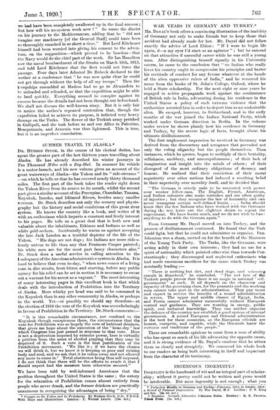WAR YEARS IN GERMANY AND TURKEY.*
Ma. DAYAL'S book offers a convincing illustration of the inability of Germany not only to make friends but to keep those that
accident had already made for her. Mr. Dayal did not follow exactly the advice of Lord Eldon : " If I were to begin life again, d—n my eyes I'd start as an agitator " ; but he entered on that attractive if unrestful career while he was still a young man. After distinguishing himself signally in his University course, he came to the conclusion that " no Indian who really loves his country ought to compromise his principles and barter his rectitude of conduct for any favour whatever at the hands of the alien oppressive rulers of India," and he removed his
name from the books of St. John's College, Oxford, where he held a State scholarship. For the next eight or nine years he engaged in active propaganda work against the continuance of British rule in India, advocating during his residence in the
United States a policy of such extreme violence that the authorities arrested him in order to deport him as an undesirable alien. He escaped, however, to Switzerland, and in the early months of the war joined the Indian National Party, which worked under German direction in Berlin. In the volume under review he shows plainly how his residence in Germany and Turkey, by the severe logic of facts, brought about his ultimate disillusionment.
The first unpleasant impression he received in Germany was derived from the discourtesy and arrogance that pervaded not only the ruling oligarchy but the people themselves. Then instances, which he quotes, began to multiply of their brutality,
selfishness, snobbery, and unscrupulousness ; of their lack of imagination and insight into the minds of others ; of their disregard of the most ordinary obligations of decency and honour. He realized that their conviction of their moral superiority over other nations had induced a resulting belief in their superiority over morality itself, and he decided that " The German is utterly unfit to be entrusted with power over weaker fellow-men. The English, French, American, and Italian colonists also make mistakes and are often guilty of injustice ; but they recognize the law of humanity and can never transgress certain well-defined limits. . . . India should know that the few Indians who have worked with the Germans during the war have not the slightest desire to repeat the experiment. We have learnt much, and we do not wish to }lava anything to do with the German again."
From Germany Mr. Dayal moved on into Turkey, and the process of disillusionment continued. He found that the Turk could fight, but that he could not administer or organize. Pan-
Islamism was a sham, carried on for the benefit of the Ministers of the Young Turk Party. The Turks, like the Germans, were
acting solely in their own interests ; they had no use for a spirit of nationality which pointed otherwise than towards Con- stantinople ; they discouraged and neglected enthusiasts who had made enormous sacrifices for the cause which Turkey was nominally leading :- "There is nothing but dirt, and dead dogs, and scheming rascals in Stamboul," he concluded. " The sad fate of the Turkish people proves that there is no magic in national self- government ' as such. It all depends on the character and capacity of the governing class, for the peasants and the working men cannot take part in the administration. They pay taxes and expect to receive the benefits of a sound administration in return. The upper and middle classes of Egypt, India, and Persia cannot administer successfully without European control and guidance. They are wanting in energy, public spirit, and technical knowledge. They can neither organize the defence of the country nor establish a good system of internal government. A mixed European and Oriental administration is the best for these countries, as the European officials are honest, energetic, and capable, while the Orientals know the customs and traditions of the people."
These are remarkable opinions to come from a man of ability who has spent so much of his life advocating the opposite cause,
and it is strong evidence of Mr. Dayal's candour that he utters them so clearly and straightly. We commend his whole book to our readers as being both interesting in itself and important from the character of its testimony.


































 Previous page
Previous page